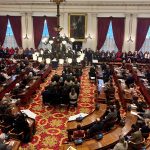Manufacturing Leaders Testify on State of the Industry
Several business leaders from across Vermont convened for an afternoon of testimony before the House Commerce and Economic Development Committee. The hearing underscored the critical role of manufacturing businesses in the Vermont economy, while also highlighting the opportunities and challenges unique to manufacturing in Vermont. The committee’s Chair recognized Chris Carrigan, Vice President of Business Development, for his 16 years of service to the industry.
In his opening testimony, Chris Carrigan elevated the Vermont Chamber’s work on supportive tax policies and transforming the state into a supply chain hub by bringing buyers, suppliers, and partners together. “We are committed to strengthening our cross-border commercial ties with Québec and Canada and supporting workforce development initiatives to bridge the skills gap and help address the labor shortage,” stated Carrigan. “Supportive tax policy and economic development are vital to Vermont’s manufacturing industry.”
Alberto Aguilar of Carris Reels (Rutland), Jay Bellows of KORE Power (Waterbury), Janette Bombardier of Chroma Technology (Bellows Falls), Julia Birnn Fields of Birnn Chocolates of Vermont (South Burlington), Rich Hornby of Mack Molding (Cavendish), and Julie Laforce of Built By Newport (Newport) each spoke to the unique products they manufacture, the value of their workforce, and the challenges and opportunities within the Vermont manufacturing community.
Labor shortage concerns, rising supply chain costs, and disruptions, as well as a lack of workforce housing, were sentiments shared by each of the manufacturers. They also expressed appreciation for the work of legislators in recent years to make Vermont a state where manufacturing can continue to grow, including the expansion of the manufacturing tax exemption, forgivable student loans for workforce retention, the partial military retiree pension tax exemption, and more.
“The importance of the tax exemption expansion has been crucial in our strategic planning,” stated Julia Birnn Fields. “We are currently reinvesting in our company and buying new, bigger machinery along with increasing our warehouse and manufacturing space. Continuing to expand upon these manufacturing tax exemptions and credits help keep our growth here in Vermont.”
Jay Bellows stated, “Today, we are doing what many thought was impossible. We have brought manufacturing back to Vermont, and manufacturing jobs here are increasing. The once shuttered facility is now being transformed into a hub of clean tech innovation and manufacturing. Our Vermont workers – some of whom hold GEDs, some advanced engineering degrees, many are graduates of our state colleges– are building battery energy storage systems that are among the safest and most efficient in the world. And they are doing it at a time when the demand for domestically built storage systems is at all-time high.”
RECENT HOUSING NEWS







